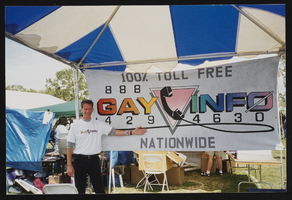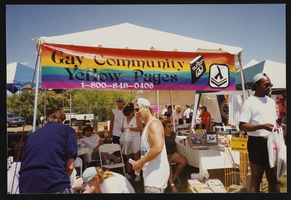Search the Special Collections and Archives Portal
Search Results
Hazel Gay oral history interview
Identifier
Abstract
Oral history interview with Hazel Gay conducted by Claytee D. White on December 02, 1995 for the Boyer Early Las Vegas Oral History Project. Gay discusses her husband being the first African-American mortician in Las Vegas, Nevada, as well as being the assistant manager at the Sands Hotel and Casino and an executive at the Union Plaza. Gay also discusses running dress shops and working as a display artist and retail clerk in other shops.
Archival Collection
James A. "Jimmy" Gay oral history interview
Identifier
Abstract
Oral history interview with James A. Gay III (Jimmy Gay) conducted by Perry Kaufman on April 12, 1972 for the Ralph Roske Oral History Project on Early Las Vegas. Gay discusses becoming the first African-American mortician in Las Vegas, Nevada and his work improving race relations, social, economic, and civic issues.
Archival Collection
James A. "Jimmy" Gay III oral history interview
Identifier
Abstract
Oral history interview with James A. (Jimmy Gay) Gay III conducted by Joyce M. Wright in 1973 for the Ralph Roske Oral History Project on Early Las Vegas. In this interview, Gay recalls details about his education in Arkansas and his training in mortuary science in Chicago, Illinois and discusses the nine-year delay in obtaining his license to practice as a mortician in Nevada because of racial discrimination. He recounts his move to Las Vegas, Nevada in 1946, his experiences as a recreation director and as a personnel and communications director for the hotel industry, work that he took while waiting for his licensure to practice. He also talks about his career as a mortician with Palm Mortuary in Las Vegas, the atomic testing of the 1950s and 1960s, and his long involvement with the NAACP and the Freedom Fund. He closes by reciting two poems that have inspired him and express his philosophy.
Archival Collection
Jimmy Gay oral history interview: audio clip
Date
Archival Collection
Description
Jimmy Gay discusses racism in Las Vegas before and after World War II. He says that prior to WWII, there wasn't a lot of prejudice, and there were only a few African American families. After WWII, he says that the influx of soldiers returning and the migration of Black families from the South led to Las Vegas becoming the "Mississippi of the West."
Sound
Gay Kauffman oral history interview, 2006 October 11
Level of Description
Archival Collection
Collection Name: Nevada Test Site Oral History Project Records
Box/Folder: Digital File 01
Archival Component
Gay Life Newsletters
Identifier
Abstract
The materials consist of monthly newsletters dated from September 1984 to August 1985 published by the National Association of Lesbians & Gays, a non-profit corporation based in Reno, Nevada. The newsletters in this collection are titled Gay Life, beginning with the inaugural issue in September 1984. The collecton includes one issue of the newsletter after its name was changed to Stonewall Voice! in August 1985.
Archival Collection

Gay Info Nationwide booth at Gay Pride: photographic print
Date
Archival Collection
Description
Image
Reno Gay Rodeo Collection
Identifier
Abstract
The Reno Gay Rodeo Collection comprises organizational records collected by Dennis McBride that document the National Reno Gay Rodeo from 1977 to 1988. It includes newspaper clippings, notes, and ephemera, as well as legal documentation from two lawsuits fought unsuccessfully in 1988 to retain the Reno rodeo. The two lawsuits were the Silver State Gay Rodeo Association vs Lawlor Events Center (1988), and the Lantry, et. al. vs Third Judicial District Court, NV (Nevada Supreme Court dismissal, 1988).
Archival Collection
Kendall Stagg oral history interview
Identifier
Abstract
Kendall Stagg oral history interview conducted by Dennis McBride on January 11, 2002 for the Las Vegas Gay, Lesbian, Bisexual and Transgender Archives Oral History Project. In the interview, Stagg discusses his early life in Utah, his religious upbringing, coming out as gay, and his involvement with the gay community in Reno, Nevada. He also talks about running for Nevada State Assembly District 32 in 2000 as one of Nevada's youngest openly gay politicians. Lastly, Stagg recalls his time as president of the Gay, Lesbian, Bisexual Student Union in University of Nevada, Reno and co-founding Reno’s first Gay Pride parades in 1999.
Archival Collection

Gay Community Yellow Pages booth at Gay Pride: photographic print
Date
Archival Collection
Description
Image
